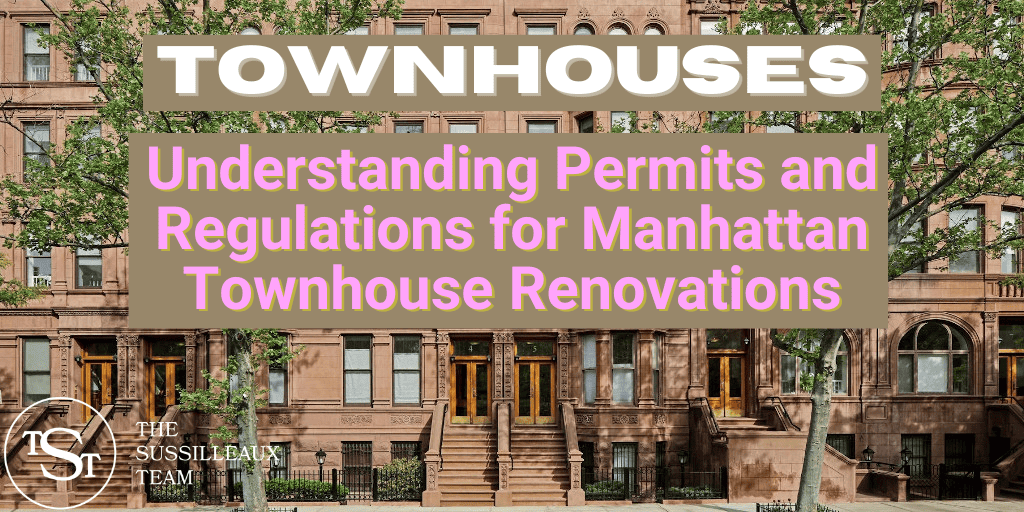he Importance of Permits and Regulations in New York City
When it comes to renovating a Manhattan townhouse, obtaining the necessary permits and adhering to building regulations is crucial. These requirements are in place to ensure the safety and compliance of your renovation, preserve the historical integrity of your property and neighborhood, and maintain property values.
While this may seem to be a non-issue for most of us, you would be surprised at the number of properties that are grossly in violation of the New York City Department of Buildings regulations.
As part of our role as real estate brokers representing the interest of our clients, whether buyers or sellers, we independently follow up with city records and filings to determine the status of a property.
Ensuring safety and compliance
Permits and regulations are designed to maintain a high standard of safety in construction and renovation projects. By following the rules, homeowners can avoid potential hazards that could endanger residents or neighbors. Additionally, compliance with building codes helps ensure that your townhouse renovation meets the legal requirements for occupancy and use.
Case Study: Literal collapse!
I had toured a building that was decrepit and not fit for habitation. The building had a list of violations as long as your arm. Unfortunately it was a refuge for homeless people who had nowhere else to go. One day there was a partial collapse of the upper floors of the building. Luckily no one was hurt, but this demonstrates the building codes and regulations are not just administrative hurdles, bur real-life safety precautions.
Preserving historical integrity
Manhattan is home to numerous historic districts, and many townhouses hold significant architectural and cultural value. Regulations and permits help protect these historical properties by ensuring that renovations are carried out in a way that preserves their unique character and heritage.
Maintaining property values
By adhering to permits and regulations, homeowners can maintain and potentially increase their property values. High-quality renovations completed according to code can attract buyers, while non-compliant work could deter potential buyers or result in costly fines and repairs.
Types of Permits and Approvals Required for Manhattan Townhouse Renovations
There are several permits and approvals you may need to obtain before beginning your renovation project, depending on the scope of work.
Building Permits
Building permits are required for various types of work, including:
Structural alterations
When making changes to the structure of your townhouse, such as removing walls or adding an extension, a building permit is typically required.
Plumbing and electrical work
Projects that involve altering or installing new plumbing or electrical systems usually necessitate a building permit.
Demolition and construction
If your renovation involves demolition or construction work, a building permit will likely be required.
Landmarks Preservation Commission (LPC) Approval
For townhouses located in a historic district or designated as individual landmarks, LPC approval is often necessary for:
Exterior alterations
Any changes to the exterior of your townhouse, such as replacing windows or doors, may require LPC approval.
Interior renovations affecting historical features
If your project involves altering or removing significant interior architectural features, you may need LPC approval.
Restoration and preservation projects
When undertaking a restoration or preservation project for a historic townhouse, LPC approval is generally required.
Certificate of Occupancy
A new Certificate of Occupancy (CO), may be necessary if your renovation involves:
Changes in building use
If you’re changing the use of your townhouse, such as converting a single-family home to a multi-family dwelling, a new CO is typically required.
Major renovations affecting safety and compliance
Significant renovations that impact the safety and compliance of your townhouse may necessitate obtaining a new CO.
PRO TIP: Not all buildings have a certificate of occupancy. One of the most common cases for this is a building class called “Single Room Occupancy”, or “SRO”. These are, or were, configured as 10 or more single bedrooms with a common bathroom. If you’re interested in purchasing a townhouse, it’s critical that you determine the status of the building. If you have any questions, feel free to reach out to Michael and Dina HERE.
Navigating the Permit Application Process
Navigating the permit application process can be complex, but working with experienced professionals and staying organized can help streamline the experience.
Working with professionals
Collaborating with knowledgeable professionals can make the permit process smoother:
Architects
Architects can help you develop plans that meet building codes and regulations, as well as assist in preparing the necessary documentation for permit applications.
Expediters
Expeditors are professionals who specialize in navigating the permitting process, helping to streamline applications and address any potential issues.
Contractors
Experienced contractors are familiar with the permit requirements for various types of renovations and can help ensure your project is compliant.
Preparing necessary documents
Having the required documentation in order is crucial for a smooth permit application process:
Architectural plans
Detailed architectural plans that outline the proposed renovations are typically required as part of the permit application.
Engineering reports
For projects involving structural changes or other complex renovations, engineering reports may be necessary to demonstrate compliance with building codes and safety standards.
LPC application materials (if applicable)
If your townhouse is in a historic district or designated as an individual landmark, you’ll need to submit additional materials to the LPC as part of your application, including detailed plans and descriptions of the proposed work.
Submission and tracking of applications
Once you have assembled the required documents, you’ll need to submit your permit applications to the appropriate agencies:
Department of Buildings (DOB) filings
Submit your building permit applications to the DOB, and track the status of your application through their online portal.
LPC application process
For projects requiring LPC approval, submit your materials to the LPC and follow their guidelines for tracking and managing your application.
Common Zoning and Building Code Regulations for Manhattan Townhouses
New York City townhouses are subject to various zoning and building code regulations, including:
Floor area ratio (FAR) and building height restrictions
FAR and height restrictions regulate the size and scale of buildings, ensuring that renovations are in line with neighborhood character and density.
Fire safety and egress requirements
Building codes mandate fire safety measures, such as fire-resistant materials and egress requirements, to protect occupants in the event of an emergency.
Accessibility and ADA compliance
Renovations may need to comply with the Americans with Disabilities Act (ADA) to ensure accessibility for all individuals, including those with disabilities.
Energy efficiency and green building standards
Building codes may require energy-efficient systems and materials to promote environmental sustainability and reduce energy consumption.
Renovating Historic Manhattan Townhouses: Special Considerations
When renovating a historic townhouse, there are additional considerations to keep in mind:
Identifying and preserving historic features
Before beginning your renovation, identify and document the historic features of your townhouse. This can help ensure that these elements are preserved and restored during the renovation process.
Working with the Landmarks Preservation Commission
Collaborate closely with the LPC to ensure your renovation plans align with their guidelines and requirements for historic properties.
Obtaining special permits for historical properties
In addition to standard building permits, you may need to obtain special permits for renovations on historical properties, such as LPC approval or other preservation-related permits.
Tax credits and incentives for historic preservation
Take advantage of tax credits and incentives available for historic preservation projects, such as the Federal Historic Preservation Tax Incentives Program or state-level programs.
Avoiding Pitfalls and Delays in the Permit Process
To avoid delays and potential issues during the permit process, consider the following strategies:
Properly assessing project scope and requirements
Before beginning your renovation, thoroughly assess the scope of your project and identify all necessary permits and approvals.
Staying current with zoning and building code changes
Regularly review zoning and building code updates to ensure your renovation plans remain compliant.
Communicating with neighbors and community boards
Keep your neighbors and community boards informed about your townhouse renovation plans, as their support can help expedite the permitting process.
Resolving permit issues and violations
Address any permit issues or violations promptly to avoid delays or potential penalties.
Conclusion
Understanding permits and regulations for townhouse renovations in New York City is essential for a successful project. By adhering to these requirements, you can ensure the safety, compliance, and historical integrity of your renovation, while also maintaining or increasing your property’s value. Collaborate with experienced professionals, stay informed about zoning and building code changes, and work closely with the appropriate agencies to navigate the permitting process efficiently. By doing so, you can create a beautiful, functional, and compliant space that meets your needs and preserves the unique character of your historic Manhattan townhouse.
Final Thoughts
Dina and I have over 40 combined years of experience with Manhattan townhouses, and the topic of permits and regulations is vitally important. We have personally seen many cases of efforts taking years and hundreds of thousands of dollars to untangle problems with permits, codes, and historical preservation rules. Having the expertise of experienced real estate brokers like us by your side will help you navigate this process smoothly and with confidence.
Further reading
You can return to The Complete Guide to Manhattan Townhouses, or go to the preceding article in the Renovating Manhattan Townhouses series: Manhattan Townhouse Renovation: Ideas and Inspirations, or move on to the next article in the section: The Benefits of Green Retrofitting for New York City Townhouses
Frequently Asked Questions (FAQs)
Frequently Asked Questions (FAQs)
- How can I find out if my Manhattan townhouse is located in a historic district?
- What are the penalties for not obtaining the required permits for a townhouse renovation?
- How long does it take to obtain a permit for a Manhattan townhouse renovation?
- Can I make changes to my renovation plans after obtaining a permit?
- Do I need a permit for minor interior renovations in my Manhattan townhouse?
How can I find out if my Manhattan townhouse is located in a historic district?
To determine if your townhouse is located within a historic district, consult the New York City Landmarks Preservation Commission (LPC) website or contact the LPC directly for guidance.
What are the penalties for not obtaining the required permits for a townhouse renovation?
Failing to obtain the necessary permits for your renovation can result in fines, stop-work orders, delays, and potential legal action. It may also negatively impact the resale value of your property and require costly remediation work to bring the project into compliance.
How long does it take to obtain a permit for a Manhattan townhouse renovation?
The time it takes to obtain a permit can vary depending on the complexity of your project and the responsiveness of the permitting agencies. Simple permit applications may be approved within a few weeks, while more complex projects may take several months to receive approval.
Can I make changes to my renovation plans after obtaining a permit?
If you need to make changes to your approved renovation plans, you may be required to submit revised plans and obtain additional permits or approvals. Consult with your architect and the relevant permitting agencies to determine the necessary steps for making changes to your project.
Do I need a permit for minor interior renovations in my Manhattan townhouse?
Some minor interior renovations may not require a permit, such as cosmetic upgrades or non-structural alterations. However, it’s essential to consult with a professional or the Department of Buildings to verify whether your specific project requires a permit or not.





